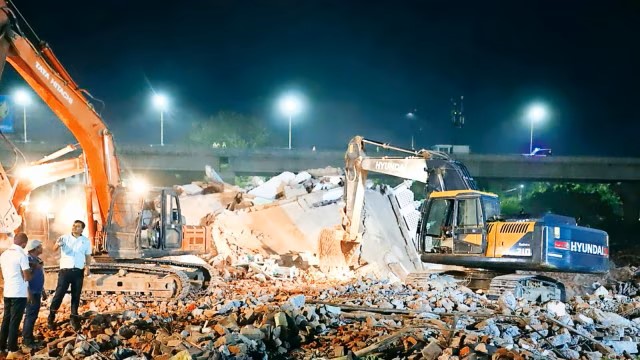20 Jun. 24: In a sweeping urban redevelopment effort, the demolition drive in Lucknow’s Akbarnagar locality concluded on Wednesday morning. The six-month-long operation resulted in the clearance of a 24.5-acre area, which housed 1,800 structures, including 1,169 residential buildings and 101 commercial establishments. This extensive project is part of the BJP government’s plan to transform the region into the Kukrail riverfront, aiming to develop it as an eco-tourism hub.
The state government has articulated a detailed roadmap to enhance the area, which includes introducing India’s first night safari. This initiative is expected to boost tourism and provide a new recreational space for both residents and visitors.
Background and Impact
The demolition drive, which began in December last year, marks a significant step towards the government’s vision for urban renewal and sustainable development. While the transformation promises economic and environmental benefits, the displacement of numerous residents and businesses raises concerns about the rehabilitation and support for those affected.
Future Prospects
The Kukrail riverfront project is envisioned as a catalyst for regional development, with plans to integrate green spaces, water bodies, and wildlife conservation efforts. The introduction of a night safari is particularly noteworthy, as it is poised to attract tourists and create unique experiences, potentially making it a landmark attraction.
Government’s Vision
The BJP government has emphasized the project’s potential to boost eco-tourism and enhance the quality of life in Lucknow. By prioritizing sustainable development, the Kukrail riverfront aims to set a precedent for future urban projects across the country.
Residents’ Perspective
To the residents of Akbarnagar, the conclusion of the demolition drive brings mixed emotions. Many families and business owners have called this area home for generations, and the sudden upheaval has left them grappling with uncertainty. The displacement has disrupted their lives, with concerns about securing new housing, reestablishing businesses, and adjusting to new communities.
The government’s promise of transforming the region into an eco-tourism hub offers a vision of progress and economic opportunity, but it also necessitates immediate and effective measures to support those who have been displaced. Residents hope for comprehensive rehabilitation plans that include fair compensation, access to affordable housing, and assistance in rebuilding their livelihoods.
While the development of the Kukrail riverfront holds potential benefits for the broader community and future generations, it is crucial that the voices and needs of the displaced residents are heard and addressed. Balancing urban development with social responsibility will be key to ensuring a sustainable and inclusive transformation of the Akbarnagar area.




